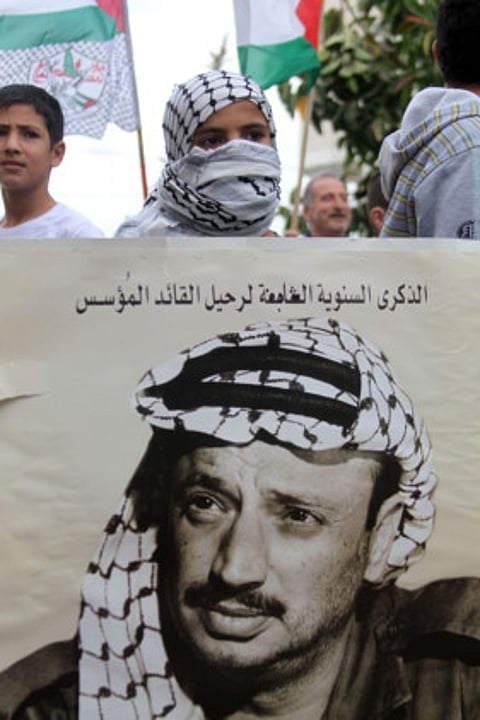Eight years on Arafat probe opens old wounds
Many Palestinians still hold on to the belief that he was poisoned by Israel

Ramallah: The Palestinians’ most explosive secret may be lurking under the stone slab covering Yasser Arafat’s tomb where experts hope to explain his mysterious death eight years ago.
When the iconic Palestinian leader died at the age of 75 in a French military hospital near Paris on November 11, 2004, French doctors were unable to say what had killed him.
Many Palestinians still hold on to the belief that he was poisoned by Israel although there has been no proof of such allegations until now.
But following the broadcast of an Al Jazeera documentary in July, in which Swiss experts reported finding abnormal quantities of the radioactive substance polonium on his personal effects, the controversy has been resurrected.
On November 26, French magistrates pursuing a murder inquiry are to arrive in the West Bank town of Ramallah along with a Swiss delegation who will work in parallel to take samples from his body for testing.
But the two investigations have rekindled an old dispute among his family members and those close to him.
The French murder inquiry was opened in late August at the request of Arafat’s widow Suha, who, at the time of his death, had refused to give her permission for an autopsy.
News of the findings after Suha had handed over Arafat’s effects for testing came as a surprise to the Palestinian National Authority.
It quickly agreed to let the investigators come and take samples “on the condition that the family ... accepts,” in a reference to his widow, his daughter Zahwa and his nephew Nasser Al Qidwa.
Tawfiq Tirawi, who is in charge of the ongoing Palestinian probe into Arafat’s death, has said the tomb can be opened only once in the presence of both sets of experts.
Qidwa, who has repeatedly accused Israel of poisoning his uncle, hailed the Al Jazeera documentary for providing the long-overdue evidence and has said there is no need for further proof by opening the grave.
He has called for the immediate formation of an international commission of inquiry to try those responsible.
Last week, Qidwa, who heads the Yasser Arafat Foundation, repeated his “opposition in principle” to an exhumation, “primarily because samples collected after eight years may not be clinically exploitable.”
“Every Palestinian is convinced that Arafat was murdered,” he told AFP, “but even opening his tomb won’t convince the sceptics of the truth.”
In a survey carried out shortly after his death in November 2004, more than 80 per cent of Palestinians said they believed there was truth in the rumour that he was poisoned by Israel.
And 93 per cent said they wanted his medical files to be made public — which eventually happened in July this year but shed no more light on the cause of death.
Unlike Qidwa, Suha Arafat has not specifically pointed the finger at Israel, telling AFP last month that “the truth about the death of the martyr Arafat is of interest to every Palestinian patriot”.
On July 31, Arafat’s widow and her daughter launched a civil suit for murder in France, with her lawyers saying the action was “against [a defendant referred to as] X meaning that Suha and Zahwa Arafat are not accusing anyone — not a specific state, a group or an individual.”
As Arafat lay dying in a military hospital near Paris, Suha — who was tightly guarding access to her husband — raised speculation that other players could be involved by accusing his top lieutenants of trying to to bury him alive.
“A handful of [people] seeking to inherit power are coming to Paris to try and bury Abu Ammar alive,” she said, using her husbands nom-de-guerre.
The remarks were directed at Mahmoud Abbas, the current president who was acting PLO chief at the time, Ahmad Qorei, who was prime minister, and Nabel Shaath, who was then foreign minister.
In light of the renewed speculation that Arafat was poisoned, Israeli officials have denied any involvement in the death and raised the suggestion that Palestinian officials and his wife were keeping crucial details from the people.
But such denials from Israel, which has been involved in killing or trying to kill a number of leading Palestinians, often in extraordinary circumstances, have little chance of changing beliefs which still remain strong on the Palestinian street eight years later.
Only last week Israel for the first time admitted that it assassinated Arafat’s deputy, Abu Jihad, in a 1988 raid on the PLO headquarters in Tunis.
Sign up for the Daily Briefing
Get the latest news and updates straight to your inbox



